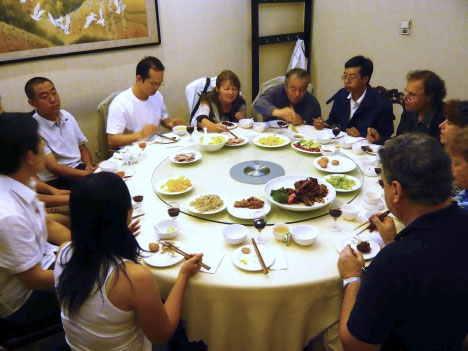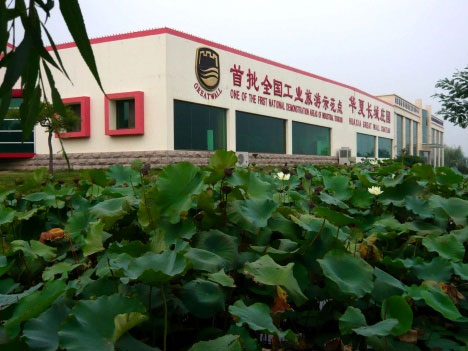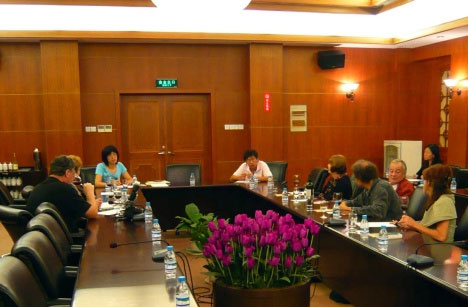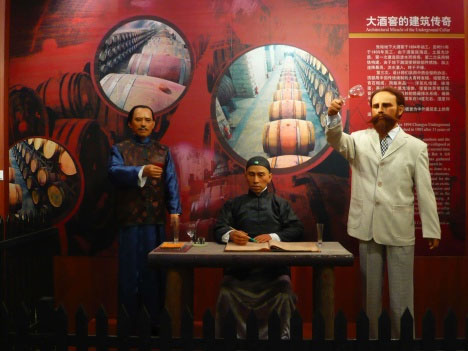Actually, I am proud of my friend Beat, who foresaw the development of the "wine country" China early on. Four years ago he organised - with the help of the Chinese embassy - one of the first exclusive wine trips of wine friends to the "Middle Land". It was not a business trip, because we didn't want to sell anything, not even wine. We simply wanted to be shown how China is now slowly, but with a lot of energy and power, entering the global wine scene. We were welcomed by oenologists, managers and authorities. Since then, I am convinced: The Chinese are coming!

|
| Talk with the authority responsible for viticulture in the north-eastern province of Hebei (Photo: P. Züllig) |
China's Hebei province offers climatic conditions similar to those of France's Bordelais or California. Here, the Austrian crystal figurine manufacturer Gernot Langes-Swarovski had vines cultivated on almost 200 hectares, built a hotel and a congress centre for wine culture, ran training courses in viticulture, and even built a manufactory for barrique barrels. Ten years ago, this was still a pioneering achievement. Today, there are at least ten large "wine factories" and trading companies, as well as hundreds of small businesses that cater to China's wine welfare. In just a few years, China has risen to become an internationally respected wine country. "Never before have I drunk a good Chinese wine," wrote a forum participant at the time in response to the column on my trip to China. Actually, I was rather laughed at back then. Today, hardly any wine lovers laugh any more. Chinese wines are still not "top wines", but the best wines from Europe, especially from France, are literally "bought up" by China!

|
| Wine% a status symbol for rich Chinese and their good business (Photo: P. Züllig) |
Wine has become a status symbol in China. The epitome of the "highest wine culture" is the Château Lafite Rothschild winery with its Premier Cru. This has always been an expensive wine, but as late as 1995 it could be bought for about 200 euros. Now it is practically unavailable, unless you are very quick at subscription, lucky and willing to pay at least 1,200 euros per bottle. Today, even the second wine from Lafite Rothschild, Carruades de Lafite, costs about 200 euros, as much as the first wine used to. Every Bordeaux lover or collector knows the consequences: The wines from famous châteaux in the Bordelais have become so expensive that collecting and drinking them becomes a thing of the past. Bordeaux has mutated into an exclusive luxury good. And the development continues: rich Chinese and Chinese trading companies are now buying wineries in the Bordelais. They are not yet the really big ones, but rather smaller or medium-sized châteaux, the 3rd and 4th row, so to speak: Château Lagarosse, for example, a vineyard in the Entre-Deux-Mers appellation, Château Viaud in Lalande-Pomerol or Château Laulan Ducos in the Médoc. It is only a matter of time before one or more of the most famous châteaux in Bordeaux become Chinese property.

|
| Domaine Experimental Viti-Vinicole Franco-Chinois (Photo: P. Züllig) |
More and more Bodeaux wines are travelling to China. In the meantime, China has overtaken the European countries Germany, Belgium and Great Britain - previously the most important markets for Bordeaux wines. In a single year (2009), China and Hong Kong together imported more than 251,000 hectolitres of wine from Bordeaux, for a total of 333 million euros. Proud figures! Anyone who thinks this is a lucrative one-way business will be mistaken. In return, Chinese are coming to the old wine countries, as buyers of wineries, but also as sellers of wines. In the meantime, Chinese wine has reached a quality that can even assert itself in the global wine trade, including in Europe. One day, "Made in China" will not only be written on cheap products, "Made in China" will also be written on many wine labels.

|
| The largest state-owned wine company "Great Wall" (Photo: P. Züllig) |
The state-owned trading company that bought Château Viaud also owns the Chinese wine brand "Great Wall", which was founded 30 years ago and is trying by all means to get away from the image of mass-produced wine and has long been bringing quality wines to the market. Four years ago, we were already amazed at what the huge wine factory can produce: also excellent wines, at prices of up to 400 euros a bottle. It would be naïve to assume that the trading company would not also try to conquer the European market. The potential - namely good wines - is definitely there (but so far they are just hardly on the market.).

|
| Tasting round with the best Chinese wines in Changyu (wine museum) (Photo: P. Züllig) |
For the time being, the wine scene is content to marvel at the purchases of wineries in the Bordelais. I read in a wine blog: "I've been able to treat myself to the Great Wall several times... it may be that it is also drinkable, but so far I have only had the 'undrinkable' version!... Whether the Chinese swallow a few American or Australian mass producers or buy a few representative châteaux, who cares?... Believe it or not, I've drunk worse than Great Wall." This statement in a wine forum reveals the attitude of many wine lovers and connoisseurs. We only take note of a development when it overtakes us. It has already done so in Bordeaux, with the drifting prices. For the low-price segment in wine, China is still a "developing country" in itself, and for its luxury brands there is no market in Europe yet. This market, however, is being initiated and built up: starting with the many Chinese restaurants, where surprisingly good Chinese wines are often served, to the shelves of Chinese grocery shops, where customers of Chinese descent shop.

|
| Wine is a tradition in China - but that tradition has been lost. Now the wine business is being rebuilt. (Photo: P. Züllig) |
Yes, the Chinese are coming: both the Chinese producers who buy wineries in Europe - mainly in the Bordelais - and the Chinese wines. At a tasting two years ago, we compared top wines from Bordeaux with those from China. At that time, we took the Chinese wines directly from China. The result? Bordeaux with its old wine tradition probably (still) won in the end, but the difference in the corresponding quality level was surprisingly small. Such tastings are still a rarity, an exclusive pleasure. But the cooperation between the companies, which is invoked every time a European winery is bought, not only brings money, but also wines from China. Frankly, I'm looking forward to it. After the Americans, Africans, Australians, why shouldn't the Chinese come to us?
Sincerely
Yours/Yours